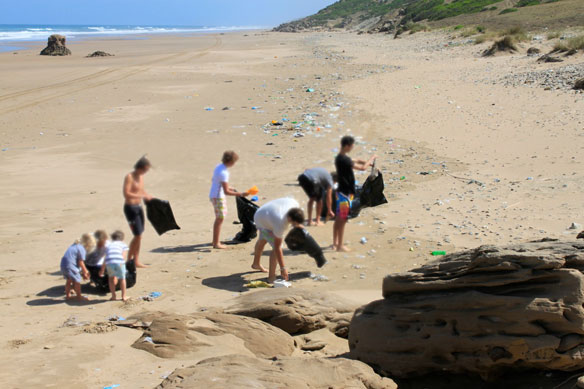
“The unprecedented plastic waste tide plaguing our oceans and shores, can become as limited as our chosen relationship with plastics, which involves a dramatic behavioral change on our part…”
Captions and Photo: © SAF — Coastal Care
Excerpts;
The world has a plastic pollution problem and it’s snowballing—but so is public awareness and action.
Each year, an estimated 18 billion pounds of plastic waste enters the world’s ocean from coastal regions. That’s about equivalent to five grocery bags of plastic trash piled up on every foot of coastline on the planet…
Read Full Article; National Geographic (10-29-2018)
To clean up ocean plastics, increase focus on coasts, Science Daily (01-19-2016)
The most efficient way to clean up ocean plastics and avoid harming ecosystems is to place plastic collectors near coasts, according to a new study…
You Can Help Turn the Tide on Plastic. Here’s How; The National Geographic (05-26-2018)
Do these six pain-free things, and you’ll help reduce the impact plastic is having on oceans and other waterways around the world…
This floating pipe is trying to clean up all the plastic in the ocean; CNN (10-11-2018)
A 2,000 foot-long floating pipe nicknamed Wilson is about to start its mission to collect all the plastic in the middle of the Pacific Ocean…
Biodegradable plastic ‘false solution’ for ocean waste problem; Guardian UK (05-23-2016)
Only 14% of plastics are recycled – can tech innovation tackle the rest? Guardian UK (02-22-2017)
Billions of pounds of plastic waste are littering the world’s oceans. Now, an organic chemist and a sailboat captain report that they are developing a process to reuse certain plastics, transforming them from worthless trash into a valuable diesel fuel with a small mobile reactor that could operate on land or at sea…
More Recycling Won’t Solve Plastic Pollution; Scientific American (07-06-2018)
The planet is on edge of a global plastic calamity; Guardian UK (06-05-2018)
More than 8. 3 billion tons of plastics made: Most has now been discarded; Science Daily (07-19-2017)
Humans have created 8.3 billion metric tons of plastics since large-scale production of the synthetic materials began in the early 1950s, and most of it now resides in landfills or the natural environment, according to a study.
These 10 companies are flooding the planet with throwaway plastic; Greenpeace (10-09-2018)
Nine months, six continents, 239 cleanup events, and more than 187,000 pieces of trash later, we now have the most comprehensive snapshot to date of how corporations are contributing to the global plastic pollution problem…
Video captures moment plastic enters food chain, BBC News (03-11-2017)
A scientist has filmed the moment plastic microfibre is ingested by plankton, illustrating how the material is affecting life beneath the waves. The footage shows one way that plastic waste could be entering the marine and global food chain…
New UN report finds marine debris harming more than 800 species, costing countries millions; United Nations (12-05-2016)
Marine debris is negatively affecting more than 800 animal species and causing serious losses to many countries’ economies, according to a United Nations report launched December 5th, 2016…
Sea salt around the world is contaminated by plastic, studies show; Guardian UK (09-08-2017)
New studies find microplastics in salt from the US, Europe and China, adding to evidence that plastic pollution is pervasive in the environment…
People may be breathing in microplastics, health expert warns; Guardian UK (05-10-2016)
People could be breathing in microparticles of plastic, according to a leading environmental health expert, with as yet unknown consequences on health…
Plastic Pollution: “When The Mermaids Cry: The Great Plastic Tide,” Coastal Care
Plastic is versatile, lightweight, flexible, moisture resistant, strong, and relatively inexpensive. Those are the attractive qualities that lead us, around the world, to such a voracious appetite and over-consumption of plastic goods. However, durable and very slow to degrade, plastic materials that are used in the production of so many products all, ultimately, become waste with staying power. Our tremendous attraction to plastic, coupled with an undeniable behavioral propensity of increasingly over-consuming, discarding, littering and thus polluting, has become a combination of lethal nature…








